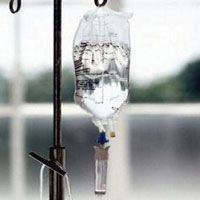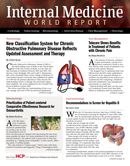Publication
Article
Internal Medicine World Report
Intravenous Ketamine Treatment Can Reduce Post-traumatic Stress Disorder Symptoms
Author(s):
Post-traumatic stress disorder and depressive symptoms may be reduced with intravenous ketamine, according to research published in JAMA Psychiatry.

Ketamine administered through intravenous (IV) methods can reduce symptoms of chronic post-traumatic stress disorder (PTSD), according to a study published online in JAMA Psychiatry on April 16.
Researchers from the Icahn School of Medicine at Mount Sinai in New York City aimed to test the safety and efficacy of intravenous ketamine for the treatment of PTSD and depressive symptoms. Patients aged 18 to 55 years with PTSD diagnoses were enrolled at Mount Sinai between May 2009 and December 2012. Eligible patients scored at least 50 on the Clinician-Administered PTSD Scale (CAPS) test, but were excluded if they had a lifetime history of psychotic or bipolar disorder, current bulimia or anorexia nervosa, alcohol abuse or dependence in the previous 3 months, serious unstable medical illness or sleep apnea, active suicidal or homicidal ideation on presentation, or current use of any psychotropic medications. Urine and blood samples confirmed patients’ active substance use and mental health.
Patients were randomized to receive a single intravenous infusion of ketamine hydrochloride (0.5 mg/kg) or midazolam (0.045 mg/kg), administered over 40 minutes on each procedure day. The doses were received 2 weeks apart. Participants were then administered to the Mount Sinai Research Unit overnight to fast and continue being monitored for blood pressure, pulse oximetry, and electrocardiographic data at 40, 120, and 240 minutes after infusion. A different researcher, blind to the placebo or ketamine infusion, tested the participants at baseline, 24 hours, 48 hours (just before patients were released from the Research Unit), 72 hours, and days 7, 10, and 13.
“These findings may lead to novel approaches in the treatment of chronic PTSD — a condition that affects a broad spectrum of adults in the United States and beyond, including victims of sexual assault, war veterans, those who have witnessed catastrophic events such as the September 11 terror attacks, and others,” Adriana Feder, MD, Associate Professor of Psychiatry at the Icahn School of Medicine at Mount Sinai and the lead author of the study, said in a statement. “However, this should be viewed as a proof of concept study. Additionally, longer term clinical trials with ketamine will be required to determine if ketamine will be a clinically useful treatment for PTSD.”
Researchers lastly tested patients using the Impact of Event Scale — Revised (IES – R), and noted scores after ketamine infusion were significantly improved over the placebo counterparts. Researchers also pointed out the lack of residual effects. PTSD symptoms in 7 patients remained significantly reduced after 14 days, compared with only one patient from the placebo group.
“In recent years, we and others have shown that ketamine could often counter the symptoms of depression in treatment-resistant cases,” continued principal investigator Dennis Charney, MD. “In the present study, we hypothesized that ketamine would be associated with significantly greater reduction in core PTSD symptom levels 24 hours after a single IV infusion, and that it would also improve co-morbid depressive symptoms in patients diagnosed with PTSD. This study has borne out that hypothesis, and we hope the results soon will be replicated and extended by other researchers.”





